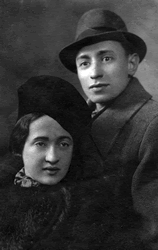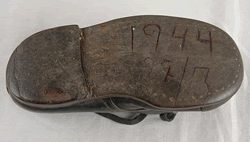The Cohen Family
Kovno, Lithuania
In 1944, the toddler Hinda was deported to Auschwitz without her parents
Tzippora and Dov Cohen, 1938, shortly after their wedding
Courtesy of Pnina Eliyahu
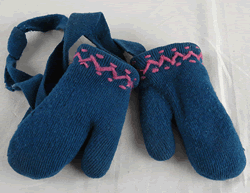
Gloves that Tzipporah knitted for Hinda from scraps of wool in the Kovno ghetto
Courtesy of Pnina Eliyahu
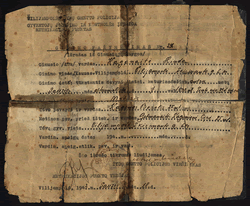
Birth Certificate of Hinda Cohen.
At the bottom of the certificate: Hinda’s date of birth – 18 January 1942, and her place of birth – Vilijampol?, the Lithuanian name for the Slobodka district where the ghetto was located.
Courtesy of Pnina Eliyahu
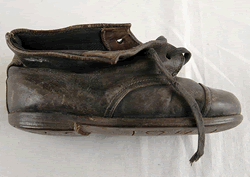
Tzipporah (née Barka) and Dov Cohen lived in Kovno. Their first child died at birth before the war.
With the German invasion of Lithuania, the couple tried unsuccessfully to escape to Soviet territory, and eventually found themselves back home in Kovno. On 18 January 1942, about six months after their relocation to the Kovno ghetto, Tzipporah and Dov had a baby girl. They named her Hinda, after Tzipporah’s mother. In late November 1943, the couple was assigned to forced labor in the Aleksotas camp for airport workers, situated outside the ghetto.
During the day, the men and women would go out to work, while the children remained in the camp with a handful of adults and elderly. The women and children were separated from the men, and each night, Tzippora and her little daughter would fall asleep in each other’s arms, wrung out with yearning, fear and hunger. When Tzipporah went off to work, an elderly camp inmate would look after Hinda, and the child became very attached to her. On 27 March 1944, trucks arrived at the camp. The adults were taken out to work via a different gate so that they wouldn’t see the trucks and try to disrupt the deportation. When the men and women returned at the end of the day, they discovered that a children’s Aktion had taken place. No children remained in the camp. The two-year-The baby shoe of Hinda Cohen, with the date of the aktion in which she was deported to Auschwitz carved into the sole by her father.
old Hinda, ill with chicken pox, had been taken from her bed wrapped in the blanket that the elderly lady had managed to cover her with in the last moment. Dov and Tzipporah went to their daughter’s bed. Dov, refusing to believe that he had lost his only daughter, bashed his head against the wall until the blood ran. Tzipporah passed out. Together, they stood for hours next to Hinda’s empty bed. Underneath it, the couple found a pair of Hinda’s shoes, and the gloves Tzipporah had knitted for her. Dov took one of the little shoes, engraved the date of the Aktion on the sole, and swore to keep the shoe forever.
The children taken away in the Aktion were loaded onto trucks, and then deported by train to Auschwitz, where they were murdered on arrival.
Following the Aleksotas inmates’ strike protesting the Children’s Aktion, some of them were permitted to return to the Kovno ghetto. Dov and Tzipporah were amongst those who went back, and from there they managed to flee to the forests, where they were later liberated by the Red Army.
In 1947, Tzipporah gave birth to another daughter, and the family immigrated to Israel in 1960.
Dov and Tzipporah requested from their family to give the objects from their daughter Hinda to Yad Vashem, and with their passing their granddaughter gave the objects of Hinda Cohen who was murdered at Auschwitz to Yad Vashem.
